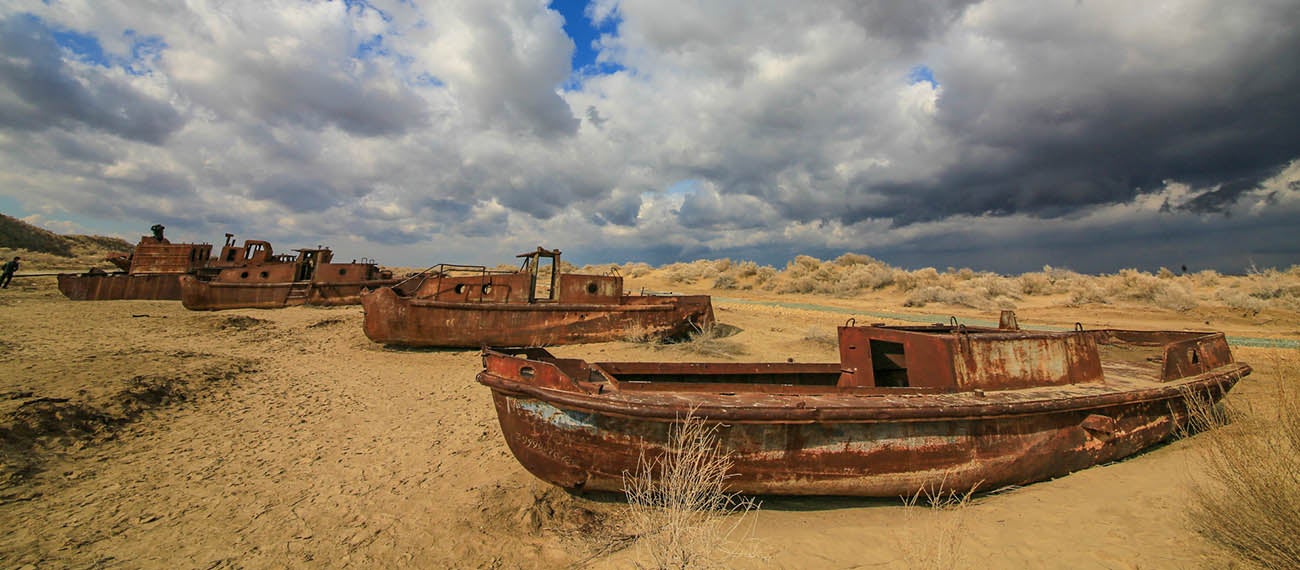 Корабли на высохшем дне Аральского моря, Узбекистан.
Корабли на высохшем дне Аральского моря, Узбекистан.
Preparing for our seven-day mission in Uzbekistan last month, we were somewhat apprehensive. Travel in the time of COVID-19 has become virtual, but this was no ordinary Zoom or Webex meeting.
We were in fact embarking on our first-ever virtual field trip under the Resilient Landscapes for Central Asia (RESILAND CA+) program, designed to increase the resilience of cross-boundary landscapes in Uzbekistan, Kazakhstan, and Tajikistan. We were meeting our partners at the Uzbekistan State Committee on Forestry and traveling virtually to the most remote corners of the country, covering a distance of more than 11,000 kilometers.
With help from our own Disruptive Knowledge, Information, and Data Services (KIDS) and its emerging technology digital toolbox, we virtually explored several regions of Uzbekistan: Surkhandaryo, on the border of Afghanistan and Tajikistan; Jizzakh, bordering Kazakhstan and Tajikistan; and the Fergana Valley, Central Asia’s breadbasket near the Kyrgyzstan border.
We zoomed in on a variety of landscapes using high-resolution satellite images, 360o photos, interactive street views, and videos to give everyone a feel for the issues on the ground. This was useful not only for our growing team, many of whom had never visited the area, but also for our clients, who were able to survey places around the world where successful landscape projects had been implemented.
We virtually visited forests, protected areas, national parks, and ecotourism sites. We even managed to chat to some residents and get a virtual “flavor” of the local cuisine.
A virtual trip has advantages over in-person travel in that it can show the change in landscapes over time. We thus observed the extent of the land degradation, desertification, and climate change impacts in Uzbekistan. We saw how the Aral Sea, once the fourth-largest lake in the world, has all but disappeared, depriving the communities that once relied on it.

During the Soviet era, intensive irrigation and agricultural practices diverted the flow of the Syr Darya and Amu Darya rivers that once fed into the sea, transforming the landscape into a desert. The environmental damage was not limited to the Aral Sea basin, as the entire Central Asian Drylands region is now among the most vulnerable to desertification, land degradation, pollution, and climate change.
In Central Asia, as elsewhere, climate change and land degradation have enormous effects on regional economies and livelihoods, a burden that is borne disproportionately by the rural poor and other vulnerable groups. Significant populations in all Central Asian countries are highly dependent on agriculture, and nearly one-third of the workforce relies on farming and livestock breeding.
Climate change–induced weather variability could affect agricultural production by up to 30%, stifling economic growth and triggering food insecurity—impacts likely further exacerbated by the COVID-19 pandemic. Restoring degraded landscapes and committing to better environmental management will build more resilient livelihoods and reduce people’s vulnerability to possible future shocks, like pandemics.
In Uzbekistan, an upcoming World Bank project, which is part of the RESILAND CA+ program, is targeting these mitigation efforts. The goal is to help rural communities adopt landscape restoration practices and make them more resilient to climate change. Regionally, RESILAND CA+ brings together Central Asian countries with shared borders and ecosystems, facilitates transboundary collaboration, and helps to catalyze the joint actions needed to restore landscapes and livelihoods.
With the Bank’s support, Uzbekistan will be implementing initiatives to reverse degradation and desertification. Planting sand- and salt-hardy trees on the dried Aral Seabed could reduce toxic dust and salt storms that sweep across the area and adversely affect people, agriculture, and livestock.
Managing drylands and mountain ecosystems protects natural resources, and healthy landscapes, soils, and water supply are integral to community well-being. As part of the Bonn Challenge, Central Asian countries have pledged to restore – by 2030 – more than 2.5 million hectares of degraded landscapes, 500,000 of which are in Uzbekistan.
As the world marks International Day of Forests on March 21, this is an opportune time to amplify our efforts to restore and protect the landscapes of Uzbekistan and the entire Central Asian region. Forests play a critical role in mitigating the impacts of climate change, increasing the resilience of people, ecosystems, and infrastructures, and preserving biodiversity. Restoring current forests—as well as planting new trees—promotes recovery, food security, and overall welfare.
Returning to our offices after the virtual trip, we understood that it had been a great learning experience for both our team and our Uzbek colleagues. Virtual travel could become a standard part of our work as we find ways to collaborate remotely with our counterparts. Although geospatial virtual travel cannot recreate real human contact, we were still able to experience the beauty and challenges of Uzbekistan’s landscapes, while forming new partnerships—all with a low-carbon footprint.
-----------------------------------------------
The virtual field visit benefitted greatly from the work of an extended RESILAND team, including Sergio Vallesi, Thomas Quinn Trudell, Askarali Saidov; and the Disruptive KIDS Helpdesk, including Akash Mehta, Hrishikesh Patel, and Isabel Ramos Tellez.
Related
Protecting Central Asia’s mountains and landscapes to transform people’s lives and livelihoods




Join the Conversation